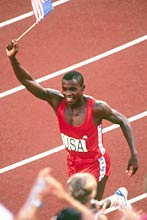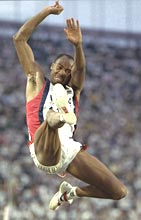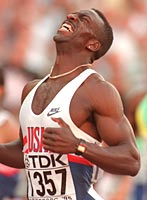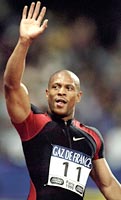
The World Athletics Championships is the third largest sporting event in the world after the Olympics and football's World Cup. Originally, it was held every four years, since it began in 1983, but following the success of the first three meets, the International Amateur Athletics Federation made it a biennial event in 1991, when it was held in Tokyo.
Some memorable moments of the past championships:
Helsinki 1983:
 The inaugural championships in the Finnish capital will be remembered for the exploits of Carl Lewis, who burst on the scene as a 22-year-old and won gold medals in the 100 metres, long jump and 4x100 metres relay, in which he anchored the United States to a world record in 37.86 seconds, to establish himself as a favourite for the 1984 Olympics.
The inaugural championships in the Finnish capital will be remembered for the exploits of Carl Lewis, who burst on the scene as a 22-year-old and won gold medals in the 100 metres, long jump and 4x100 metres relay, in which he anchored the United States to a world record in 37.86 seconds, to establish himself as a favourite for the 1984 Olympics.
Edwin Moses and Steve Cram also made a mark, winning their respective events, the 400 metres hurdles and 1,500 metres, and Ireland's Eamonn Coghlan won the 5,000 metres.
Eastern Bloc athletes dominated the women's sprints. Czechoslovakia's Jarmila Kratochvilova posted a world record while winning the 400 metres in 47.99 seconds and East Germany's Marita Koch took the 200 metres. Oelsner-Göhr Marlies of East Germany won the 100 metres dash in 10.97 seconds.
Rome 1987:
Ben Johnson won the 100 metres in a world record time of 9.83 seconds. However, the Canadian was stripped of the title following his positive test for anabolic steroids at the 1998 Seoul Olympics. In the process, Carl Lewis, who had finished second in 9.93 seconds, was handed the title.
The middle distances were dominated by African men. Kenya's Billy Konchellah won the 800 metres in 1:43.06 seconds to post a Championship record while Somalia's Abdi Bile won a close 1,500 metres race in 3:36.80 seconds. The then Olympic champion Said Aouita won the 5,000 metres in 13:26.44 seconds.
Among the women, Bulgaria's Stefka Kostadinova lowered the world high jump mark, clearing 2.09 metres in the women's high jump, and East Germany's Gladisch-Möller Silke emerged the fastest women of the meet, winning the 100 metres in 10.90 seconds and setting a new Championship record. Another East German, Silke Gladisch-Möller, set a Championship record in winning the 200 metres in 21.74 seconds. She finished ahead of Florence Griffith-Joyner and Merlene Ottey in that order.
Tokyo 1991:
 Bob Beamon's 23-year-old world record was obliterated. In one of the greatest battles in field events history, Mike Powell cleared 8.95 metres to set a World record and beat Carl Lewis (8.91 metres). Lewis, however, won the 100 metres in a world record time of 9.86 seconds as six runners -- Leroy Burrell, Dennis Mitchell, Linford Christie, Frankie Fredricks and Raymond Stewart -- clocked under 10 seconds.
Bob Beamon's 23-year-old world record was obliterated. In one of the greatest battles in field events history, Mike Powell cleared 8.95 metres to set a World record and beat Carl Lewis (8.91 metres). Lewis, however, won the 100 metres in a world record time of 9.86 seconds as six runners -- Leroy Burrell, Dennis Mitchell, Linford Christie, Frankie Fredricks and Raymond Stewart -- clocked under 10 seconds.
Michael Johnson won his first world gold medal from the 200 metres, clocking 20.01
Seconds, and Sergei Bubka won his third world title in the pole vault, clearing 5.95 metres in his final attempt.
Katrin Krabbe, representing a reunited Germany, bagged a double, stole the limelight among the women, winning the 100 and 200 metres sprints, in 10.99 seconds and 22.09 seconds respectively.
Stuttgart 1993:
Briton Linford Christie, at age 32, showed his Olympic title at Barcelona was no fluke as he finished ahead of Americans Andre Cason, Dennis Mitchell and Carl Lewis in that order, in 9.87 seconds, to win the 100 metres dash.
Ethiopian Haile Gebrselassie came up with a brilliant final lap to win the 10,000 metres in 27:46.02 seconds. In winning his first major title, he beat back a strong challenge from fancied Kenyan runners Moses Tanui and Richard Chelimo.
Colin Jackson established a world record in the 110 metres hurdles, clocking 12.91 seconds, as did Sally Gunnell in winning the women's 400 metres hurdles, in 52.74 seconds.
Jamaican sprinter Merlene Ottey finally struck gold at the world championships, winning the women's 200 metres in 21.98 seconds. She finished second in the 100 metres, losing to the United States' Gail Devers in a photo-finish. Both athletes clocked 10.82 seconds.
Sergei Bubka won the pole vault, clearing 6.00 metres to set a Championship record and become the the first athlete to win titles at every meet.
Gothenburg 1995:
 Michael Johnson scored a unique treble, winning the 200 and 400 metres and a gold in the 4x400m relay, and Canada's Donovan Bailey won the 100 metres in 9.97 seconds, beating compatriot Bruny Surin.
Michael Johnson scored a unique treble, winning the 200 and 400 metres and a gold in the 4x400m relay, and Canada's Donovan Bailey won the 100 metres in 9.97 seconds, beating compatriot Bruny Surin.
Merlene Ottey retained her 200 metres title in 22.12 seconds, but, like in Stuttgart, had to settle for second place in the 100 metres, beaten by Gwen Torrence, who clocked 10.85 seconds.
At 18 years 135 days, Irina Stankina of Russia became the youngest world champion when she won the 10 kilometres walk.
Jonathan Edwards erased his own triple jump world record in clearing 18.29 metres.
Athens 1997:
Ethiopian sensation Haile Gebrselassie won his third successive 10,000 metres gold, clocking 27:24.58 seconds and beating Kenyan Paul Tergat in a close race, while Kenyan-born Wilson Kipketer, representing Denmark, took the men's 800 metres, clocking 1:43.38 seconds.
Sergei Bubka won the last of his six world pole vault titles, establishing a championship record of 6.01 metres.
But it was the sprints which proved the biggest draw as Maurice Greene won the men's 100 metres in 9.86 seconds, beating beat Donovan Bailey and Tim Montgomery, and Trinidad's Ato Boldon finally tasted success, winning the 200 metres. Marion Jones bagged the women's 100 metres in 10.83 seconds to win her first international sprint title.
The women's 200 metres was won by the Ukraine's Zhanna Tarnopolskaya-Pintusevich. In 22.32 seconds. Sri Lanka's Susanthika Jayasinghe finished second while Ottey placed third.
Seville 1999:
 Maurice Greene became the first man to complete the sprint double at the World championships after winning the 200 metres in 19.90 seconds. Earlier, he had won the 100 metres in 9.80 seconds.
Maurice Greene became the first man to complete the sprint double at the World championships after winning the 200 metres in 19.90 seconds. Earlier, he had won the 100 metres in 9.80 seconds.
Marion Jones looked on course to do the same after winning the women's 100 metres but collapsed in agony in her 200 metres semi-final.
Michael Johnson won the 400 metres in a world record time of 43.18 seconds and Hicham El Guerrouj and Gabriela Szabo retained their 1,500 metres and 5,000 metres titles respectively.
Spain forgot its obsession with football and cheered defending champion Abel Anton to the marathon gold. Anton closed on the Japanese leader Nobuyuki Sato after two hours of arduous competition and drew away as he entered the stadium to win in 2:13:36 seconds.
Edmonton 2001:
Maurice Greene led a United States clean sweep in the men's 100 metres final, finishing in 9.82 seconds, the fastest time of the year, but suffered an injury in the last stages of the race. Tim Montcomery was second in 9.85, ahead of Bernard Williams in 9.94.
Zhanna Pintusevich-Block of the Ukraine caused a huge upset when she beat defending and Olympic champion Marion Jones to win the 100 metres final in 10.82 seconds, the fastest time in the world that year. Jones finished in 10.85 seconds ahead of Ekaterini Thanou of Greece, who won bronze in 10.91 seconds.
But controversy surrounded the first championships held in North America as Russian runner Olga Yegorova was booed her before and after winning the women's 5,000 metres. Indeed, it was the most unpopular victor of the championships. Yegorova had tested positive earlier in the year for the endurance-boosting drug EPO. She was originally banned from the championships but reinstated on a technicality.
El Guerrouj won his third 1,500 metres race as Haile Gebrselassie's 10,000 metres crown was taken Kenya's Richard Limo.
